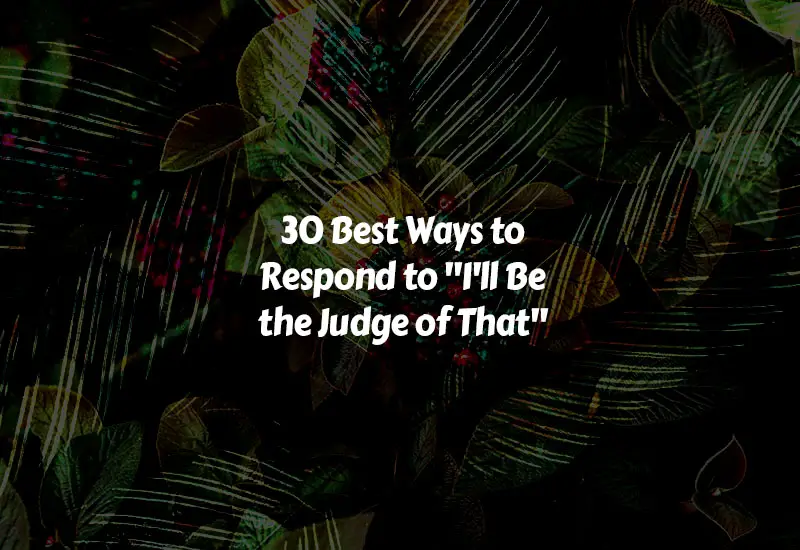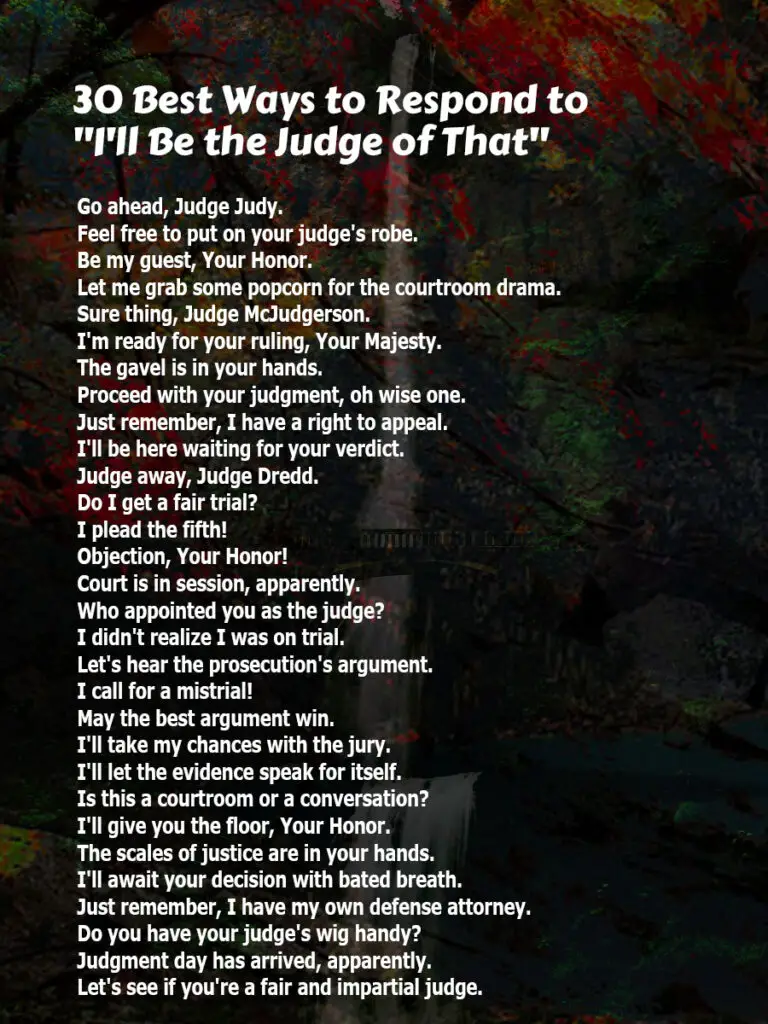Have you ever heard someone say, ‘I’ll be the judge of that’? It’s a common phrase people use when they doubt something or want to make their own decision. But what should you say back? Don’t worry! In this article, we’re going to explore 30 of the best ways to respond to ‘I’ll be the judge of that.’ Whether you want to be funny, confident, or just get your point across, we’ve got you covered. By the end, you’ll have plenty of clever comebacks to use in any situation.

Here are 30 Best Ways to Respond to “I’ll Be the Judge of That”:
- Go ahead, Judge Judy.
- Feel free to put on your judge’s robe.
- Be my guest, Your Honor.
- Let me grab some popcorn for the courtroom drama.
- Sure thing, Judge McJudgerson.
- I’m ready for your ruling, Your Majesty.
- The gavel is in your hands.
- Proceed with your judgment, oh wise one.
- Just remember, I have a right to appeal.
- I’ll be here waiting for your verdict.
- Judge away, Judge Dredd.
- Do I get a fair trial?
- I plead the fifth!
- Objection, Your Honor!
- Court is in session, apparently.
- Who appointed you as the judge?
- I didn’t realize I was on trial.
- Let’s hear the prosecution’s argument.
- I call for a mistrial!
- May the best argument win.
- I’ll take my chances with the jury.
- I’ll let the evidence speak for itself.
- Is this a courtroom or a conversation?
- I’ll give you the floor, Your Honor.
- The scales of justice are in your hands.
- I’ll await your decision with bated breath.
- Just remember, I have my own defense attorney.
- Do you have your judge’s wig handy?
- Judgment day has arrived, apparently.
- Let’s see if you’re a fair and impartial judge.
See Also: 35 Best Ways to Say When Someone Says They Look Up to You
Maintaining Composure
Responding diplomatically to a challenging statement like “I’ll be the judge of that” not only requires tact and grace but also the ability to maintain composure. By calmly navigating through the conversation, you can effectively defuse tension and keep the dialogue constructive.
Practicing Active Listening
When faced with a statement challenging your viewpoint, an important component of maintaining composure is to practice active listening. This means fully engaging with the speaker, maintaining eye contact, and resisting the urge to interrupt. By actively listening, you show respect and gain a deeper understanding of the speaker’s perspective, fostering a more amicable environment for dialogue.
Another method for maintaining composure in the face of a disapproving remark is to use neutral language. Avoid responding with emotionally charged words and instead opt for neutral language that conveys your point calmly and purposefully. By doing so, you can keep the conversation respectful and help prevent the situation from escalating into a heated exchange.
Redirecting The Conversation
When faced with someone who says, “I’ll be the judge of that,” it can be tempting to respond with defensiveness or aggression. However, a diplomatic approach is often more effective in diffusing tension and redirecting the conversation towards productive dialogue. In this article, we will explore two powerful techniques: shifting focus to common ground and proposing to explore differences together.
Shifting Focus To Common Ground
One way to diplomatically respond to someone who claims to be the ultimate judge is to shift the focus of the conversation towards common ground. By affirming shared beliefs or experiences, you can create a connection that encourages a more open-minded discussion.
Here’s an example of how you can employ this technique:
- Listen actively: Pay close attention to their perspective and demonstrate that you value their opinion.
- Establish common ground: Find points of agreement or shared experiences to establish a foundation for the conversation.
- Highlight the shared objective: Emphasize the ultimate goal or outcome both parties desire, underscoring the importance of collaboration instead of judgment.
- Suggest a collaborative approach: Propose that by working together, you can achieve a more comprehensive understanding of the topic at hand.
- Invite their input: Encourage them to share their perspective and actively engage in the conversation, fostering a sense of inclusivity and mutual respect.
Remember, the key is to redirect the conversation away from judgment and towards a constructive exploration of ideas and perspectives.
Proposing To Explore Differences Together
Another method for diplomatically responding to those who assert their judgment is to propose exploring differences together. By shifting the focus away from a binary judgment to an opportunity for mutual learning and growth, you can foster a more collaborative and open-minded conversation.
Consider the following approach:
- Acknowledge different perspectives: Validate their viewpoint by acknowledging that different opinions exist and that understanding these differences can be valuable.
- Show curiosity: Display genuine curiosity about their reasoning behind their judgment, demonstrating a willingness to understand their perspective.
- Express your curiosity: Share your own perspective and express interest in learning from their experiences and knowledge.
- Invite a dialogue: Propose a dialogue where both parties can freely exchange ideas and perspectives without the pressure of judgment.
- Highlight potential learning opportunities: Emphasize the potential for personal growth and expanded understanding that can arise from exploring diverse viewpoints.
By proposing a collaborative exploration of differences, you create an environment where conversations can evolve into meaningful exchanges that promote understanding and respect.
Establishing Mutual Respect
In response to “I’ll be the judge of that,” it’s important to establish mutual respect. Respond diplomatically by acknowledging the other person’s perspective and suggesting a respectful dialogue to find common ground. This approach can foster positive communication and prevent conflicts.
Acknowledging Different Perspectives
When engaging in a discussion where someone says, “I’ll be the judge of that,” it’s essential to establish mutual respect by acknowledging different perspectives. Remember that everyone comes from unique backgrounds and experiences, shaping their viewpoints. By acknowledging this, you create a foundation for open and respectful communication.
Expressing Appreciation For Input
Expressing appreciation for the input of others is another important aspect of establishing mutual respect. When someone says, “I’ll be the judge of that,” it can be a sign of their desire to contribute their perspective. Show gratitude for their willingness to share their thoughts and value their input. This will foster a more positive and collaborative environment for discussion.
Here are some ways you can respond diplomatically and express appreciation for their input:
- Begin by thanking them for taking the time to share their thoughts.
- Highlight specific points in their input that you find valuable or interesting, showing that you have considered their perspective.
- Use phrases such as “I appreciate your input” or “Thank you for contributing to the discussion.”
Remember, expressing appreciation for input helps build trust and encourages others to engage in dialogue more freely.
By establishing mutual respect through acknowledging different perspectives and expressing appreciation for input, you create a positive and collaborative atmosphere for discussion. This approach encourages everyone to share their thoughts and opinions without fear of judgment. It fosters a deeper understanding of diverse viewpoints and promotes more effective communication overall. Keep these strategies in mind the next time you encounter someone saying, “I’ll be the judge of that.”
Deescalating Tension
When met with a statement like “I’ll be the judge of that,” it’s important to respond diplomatically to deescalate tensions and maintain a respectful conversation. By utilizing strategic communication approaches, you can navigate through potentially contentious situations with finesse and grace, promoting a cooperative environment.
Avoiding Power Struggles
Avoid engaging in power struggles with the individual who asserts, “I’ll be the judge of that.” Instead, maintain composure and refocus the conversation on the issue at hand. Acknowledge their perspective while steering the dialogue towards a collaborative exchange.
- Remain composed
- Refocus the conversation
- Acknowledge their perspective
Reiterating Your Position Diplomatically
Reiterate your position in a diplomatic manner to assert your viewpoint without causing friction. Use respectful language and aim to find common ground to build upon, rather than emphasizing differences.
- Politely restate your stance
- Emphasize respect in language
- Seek common ground
See Also: 30 Best Ways to Say to Someone Who Doesn’t Remember You
More Additional Response
- Are we playing judge and jury now?
- Let’s keep the legal jargon to a minimum, shall we?
- I didn’t realize I entered the courtroom of life.
- Do I need to swear on the Bible?
- Let’s agree to disagree, Your Honor.
- Your verdict awaits, O mighty judge.
- Should I prepare my closing statement?
- I’m innocent until proven guilty, right?
- Can we get a recess?
- Is this a case of mistaken identity?
- The verdict is in your hands, Your Honor.
- Is the courtroom in session or just your opinion?
- Let’s settle this out of court.
- I didn’t know I was on trial for my life choices.
- Let’s keep the legal drama to a minimum.
- Are you the judge, jury, and executioner?
- I’ll file an appeal if I don’t like the ruling.
- Can I call character witnesses?
- Let’s not make this a legal battle.
- I object to this line of questioning!

I hope these responses help you feel confident when someone doubts you. Remember, it’s okay to stand up for yourself, but it’s also good to keep things light-hearted. Whether you’re being funny or serious, responding to “I’ll be the judge of that” can be fun and empowering. Keep being awesome!









